Understanding Blues Drugs: Risks & Effects
Blues drugs, also known as blue pills or blue devil, are a type of synthetic drug that has gained popularity in recent years. These drugs are often marketed as a legal and safer alternative to illicit substances, but the reality is that they pose significant risks to the user’s health and well-being.
In this section, we will explore what blues drugs are, the potential health risks associated with their use, and the various side effects that can occur when these drugs are misused.
Key Takeaways:
- Blues drugs are synthetic substances that are marketed as a safer alternative to illicit drugs.
- Misuse of blues drugs can lead to serious health risks, both physical and mental.
- Common side effects of blues drugs include headaches, nausea, agitation, and hallucinations.
- It’s important to stay informed about blues drugs and their potential risks to make informed decisions regarding one’s health.
The Definition and Characteristics of Blues Drugs
Blues drugs, also known as blue magic or blue devil, are a type of synthetic opioid that includes fentanyl and its derivatives. The drug is typically sold in pill form and varies in color from blue to gray, hence the name.
The characteristics of blues drugs include their extreme potency, which is 50 to 100 times more powerful than morphine. The potency of blues drugs makes it a highly dangerous substance and can easily lead to overdose and potentially fatal health consequences.
In addition to the increased potency, blues drugs are also highly addictive and can lead to physical and psychological dependence. Due to the risks associated with blues drugs, it is crucial to understand the definition and characteristics of these dangerous substances and the potential risks involved in their use.

Comparative Characteristics of Blues Drugs and Other Opioids
| Blues drugs | Morphine | Oxycodone | |
|---|---|---|---|
| Potency | 50-100 times stronger | Less potent | 10 times stronger than morphine |
| Addictiveness | Highly addictive | Less addictive | Highly addictive |
| Common street names | Blue magic, blue devil | M, MS, morpho, white stuff | Oxy, OC, hillbilly heroin |
Source: National Institute on Drug Abuse, https://www.drugabuse.gov/drug-topics/opioids/opioid-crisis-challenge-solutions/opioid-overdose-crisis
As shown in the table, blues drugs are significantly more potent and addictive than other opioids, making them a greater health risk for individuals who misuse these substances. Understanding the definition and characteristics of blues drugs is crucial in preventing the misuse of these dangerous and potentially fatal substances.
Health Risks Associated with Blues Drugs
Blues drugs pose significant health risks to individuals who use them, both in the short and long term. The drugs often contain highly addictive substances and can be deadly if not used properly. In fact, misuse of these drugs is now considered one of the leading causes of accidental death in the United States.
Short-Term Effects
The immediate effects of blues drugs on physical and mental health can be severe. Individuals who use these drugs may experience a range of symptoms, including:
- Extreme euphoria: The initial rush of the drug can create feelings of intense pleasure and happiness.
- Confusion: Users may experience a distorted sense of time or reality.
- Paranoia: Some individuals become fearful or anxious, sometimes experiencing hallucinations or delusions.
- Heart problems: These drugs can cause dangerously high blood pressure and heart rates, which may lead to heart attacks or strokes.
- Respiratory issues: Shallow breathing is a common side effect that can be life-threatening in some cases.
Long-Term Effects
The chronic use of blues drugs can cause significant damage to a person’s health and well-being. Long-term effects may include:
- Depression and anxiety: Prolonged use of blues drugs can disrupt brain chemistry, leading to depression, anxiety, and other mood disorders.
- Organ damage: Over time, these drugs can cause significant damage to the liver, kidneys, and other vital organs.
- Memory loss and cognitive impairment: Chronic use can have lasting effects on learning, memory, and other cognitive functions.
- Addiction: Blues drugs are highly addictive, and even a single use can lead to dependence and withdrawal symptoms.
It is essential to seek professional help if you or someone you know is struggling with addiction to blues drugs. Immediate treatment can help prevent long-term health complications and potentially save a life.
Side Effects of Misusing Blues Drugs
When blues drugs are misused, they can cause a range of harmful side effects that can have immediate and lasting consequences on a person’s health. Misuse of blues drugs can lead to both physical and mental health problems.
Immediate Physical Side Effects of Misusing Blues Drugs:
The immediate physical side effects of blues drugs misuse can include:
- Tremors and seizures
- Agitation and restlessness
- Irregular heartbeat
- Nausea and vomiting
- Confusion and disorientation
- Loss of consciousness
Long-Term Physical Side Effects of Misusing Blues Drugs:
The long-term physical side effects of blues drugs misuse can include:
- Liver damage
- Respiratory problems
- Kidney damage
- Cardiovascular disease
- Chronic pain
- Increased risk of infection
Psychological Side Effects of Misusing Blues Drugs:
Misusing blues drugs can also lead to psychological side effects, such as:
- Depression and anxiety
- Paranoia and psychosis
- Mood swings
- Memory loss and cognitive impairment
- Suicidal or homicidal thoughts
- Behavioral changes and social withdrawal
It is important to be aware of the potential side effects of blues drugs misuse and to seek help if you or someone you know is struggling with addiction or substance abuse.

Conclusion
Blues drugs are a dangerous class of substances that pose significant health risks to individuals who misuse them. This article has provided an in-depth understanding of what blues drugs are, their potential health risks, and the various side effects that can occur when they are misused.
It is essential to stay informed about these drugs and their risks. This knowledge allows individuals to make informed decisions about their health and wellbeing. If someone suspects they or someone they know is misusing blues drugs, it is crucial to seek help immediately.
By taking action and staying informed, it is possible to mitigate the risks associated with blues drugs. Remember, prevention is always better than cure, and staying informed is the first step towards a healthier, happier life.
Stay safe, stay informed, and always remember the potential health risks associated with blues drugs.
FAQ
What are blues drugs?
Blues drugs is a term used to describe a group of illicit substances that typically induce a sense of relaxation and euphoria. They are known for their blue color and are often sold as pills or capsules.
What are the health risks associated with blues drugs?
The use of blues drugs can pose various health risks. Short-term effects may include increased heart rate, elevated blood pressure, and nausea. Long-term use can lead to addiction, cardiovascular problems, organ damage, and mental health issues.
What are the common side effects of misusing blues drugs?
When blues drugs are misused, individuals may experience a range of side effects. These can include dizziness, confusion, impaired coordination, memory loss, mood swings, anxiety, depression, and impaired judgment.
How can I reduce the risks associated with blues drugs?
The most effective way to reduce the risks associated with blues drugs is to avoid their use altogether. If you or someone you know is struggling with substance misuse, seeking professional help from healthcare providers, counselors, or support groups can provide guidance and assistance.
Can blues drugs cause overdose?
Yes, blues drugs have the potential to cause overdose. When taken in high doses or combined with other substances, such as alcohol or opioids, they can suppress the central nervous system, leading to respiratory depression, loss of consciousness, and even death.
Are blues drugs addictive?
Yes, blues drugs can be highly addictive. The euphoric effects they produce can create a strong psychological and physical dependence, making it difficult for individuals to stop using them without professional help.
